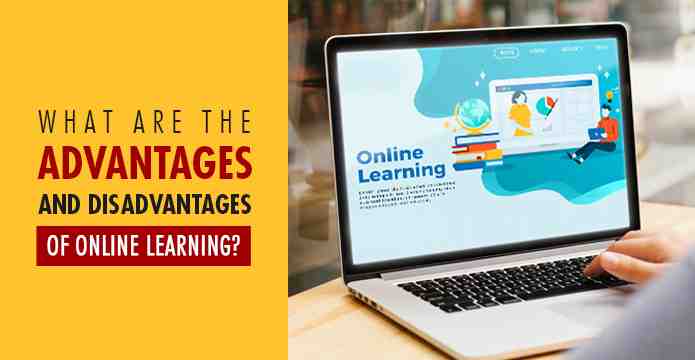The coronavirus pandemic that is claimed to have begun in the wet market of Wuhan in China has upended the entire world. Whether it’s employment or, employability, recreation to healthcare operation, from the startups to the global firms, every aspect suffered a harsh blow of this crisis. As we drift our focus to the educational system, it stands as one amongst several to encounter an unexpected transition. With the schools, colleges, and universities being forced to shut down across the world, the future of the young learners was pushed towards greater risk.
But, thanks to technological progress and innovation. The technique of e-learning and online resources acted as a windfall to bring an end to this learning deficit within a short duration.
Despite this hasty transition entwined with a contemporary educational approach, there exist certain pros and cons of online learning, be it during the pandemic or, the post-pandemic era. Let’s begin and get to know a few, one by one.
Online learning is an effective way to acquire an education but not everyone can afford it.
Who doesn’t like to get access to lessons and learning material from the comfort of one’s home? The majority would prefer it as it saves you from the compulsion to confront your strict teacher. It liberates you from the obligation to be present at your desk at 8:30 a.m. It redeems you from the boring lengthy lectures and the compulsion to go to college every day to amass a decent 75% attendance. Online learning conveniently bestows you with everything at your fingertips while liberating you from every manual obligation.
On the contrary, not everyone can easily afford digital learning. It is not distributed for free. Even if it is, the entire process of e-learning requires a set of convenient essentials such as a laptop and stable broadband that allows endless access to the Internet. Speaking of the privileged, they can easily afford every equipment and supplies required for the online classes. In India, the majority lack these basic essentials. Apparently, they are the ones who suffer the loss and severely affected by the crisis. In India alone, lakhs of students are deprived of online education due to poverty and lack of resources.
Online education is cost-effective, quick, and easy. Yet it fails to keep up with the standard of manual classrooms:
Online learning is exceedingly contradicted to the manual mode. In the latter, you are compelled to travel a certain distance to learn a subject. Online mode, on the contrary, is relatively cost-effective and easy. It saves you from extra time and energy in traveling. It further cuts down the expense of transport and fuel. You can utilize the amounted time of travel in learning a new topic or pick a skill.
Regardless of all the advantages, online learning prevents educators from being physically present around the students. It prevents them from providing personalized guidance and manual communication. Online education does not guarantee consistency as the learners might drop out in the middle of the class due to power failure or the lagging internet. Despite the genuine reasons to opt-out of the middle of the lesson, at times, such behavior becomes questionable and hard to cope up with. Even with a catalog of credits, online learning still fails to conserve the decorum and the discipline of the physical classrooms. Also, the physical presence generates learning enthusiasm. Learning becomes effective with face to face interaction. Online learning strategy somewhat lags to keep up with the criterion of the manual learning.
Online learning ensures broader exposure. But, it fails to guarantee a realistic experience, and the quality of learning often becomes questionable:
The internet is the storehouse of information. With the explosion of e-learning, the world wide web has evolved as an infinite source of content. Right from accessing the lesson schedule to examination dates, deriving information for drafting assignments, and learning new subject to picking up any skills, every single information required can be obtained from the internet. On the comparative method of learning and exploring, the internet provides you with a boundless possibility to excavate new subjects and further help you improve your learning experiences.
On the contrary, manual learning ensures the original impression of a subject through practical learning experiences. For example, if you are learning culinary arts, the manual procedure enables you to actually observe the stepwise procedure. It further ensures you to gain hands-on experience and prepare you to ace the skill. Manual learning, therefore, is the ideal way of learning as it literally requires your thorough involvement, be it through vigilance or hands-on training. It incites your zeal and thus, brings a thrill in the overall learning process. If we compare the digital learning with the manual, the latter deserves much acclaim for obvious reasons.
Online learning acquaints learners and educators with new software platforms and contemporary resources. However, it detaches them from the real community:
Right from the entering best communication platform to finding the best software dashboard to compile the notes and lectures, online learning indeed takes both the learners and the educators on a journey of grand discovery of tools and resources. No doubt, these modern tools and, resources are fascinating and engaging. The online mode of learning can well encourage the learners and educators to do more and go beyond while doing research towards learning and discovering, the best and ideal tools to expand their knowledge better.
On the contrary, online learning at times be burdensome. You might end up browsing and clicking on the flashy notifications that could lead you to end up being in front of your computer for hours. Well, if we assess the current situation, this is the best way to survive indoors during the lockdown. However, such as habit might foster internet addiction. Your habit might get you separated from the rest of the world. On a positive note, we are social beings. We need to communicate and interact from time to time. It is necessary, mainly for our mental well being.
Online learning fails to bring in the fun and excitement of being around with friends. It can at times be devastatingly isolated. So, it’s crucial for you to call your friends and speak with your parents and loved ones to shun from the negative sentiments of isolation.
In a conclusive note, there are extensive reasons to promote the online learning amid this pandemic. Despite the abrupt shutdown and the transition, online education to some extent has given us a hope to keep up the ebb of learning alive. There is a brighter aspect of this modern and fresh approach to learning supported by favorable resources and digital platforms.
On the contrary, it is also crucial to pay heed to the dark side of this situation. There still exists a gap between the privileged and the underprivileged. While we encourage online learning throughout the country, there still are many who struggle to get past the line of deprivation to obtain their basic rights to education. Our government, including the educational institutions, are still making efforts to bridge this learning gap since the advent of lockdown.
Albeit, online learning has emerged as a windfall, but it hasn’t been accessible to the impoverished lot across the world. However, with continuous effort, we can definitely bridge this learning gap. Certainly, we will soon attain the milestone of unbiased and quality education for one and all.
ADVANTAGES AND DISADVANTAGES OF ONLINE LEARNING
Will online teaching and learning replace conventional class room based teaching? More important, what are the advantages and disadvantages of online teaching? Online learning has its advantages as both students and teachers have recently realized in the wake of the lockdown.
Teachers and students are now optimizing online resources in an effective manner. People who were hesitant to switch over to digital platforms suddenly discovered the huge advantages which always existed online but was not utilized. There is little doubt that online teaching will not go away after the pandemic when normal life is restored. The reasons are obvious.
First, an increase in the utilization of digital resources and digital modes of teaching online or offline is in the offing. One can expect greater use of interactive digital boards and other digital devices in the class and a switch over to technology aided learning.
Second, during school disruptions due to bandhs or strikes (which are common in India) schools might shift to online teaching on that day instead of considering the day as a de facto holiday.
Third, a shift to online evaluation – more and more schools are likely to switch over to online mode for class tests. As online evaluation is much easier and quicker this may become the popular trend.
The change is more likely to be observed in colleges. Students would be more inclined towards multiple short term online courses besides the under graduate degree course they are studying in college.
Recently the UGC has allowed students to pursue two parallel undergraduate degree courses together (one in online mode) which was not permitted before. Therefore the trend of a student taking up an allied degree or diploma course along with the main college degree course is quite likely. Pursuing dual courses is only possible when one of them is in online mode.
However classroom based teaching is going to stay and can never be replaced. This is due to the fact that online teaching system has certain lack certain aspects which are indispensable and due to which it can never replace traditional class room based learning.
The main disadvantage is online companionship based on interactions through the internet is not real. After a certain stage, people need the real life presence of teachers and friends, of people whom they can feel, touch and talk too. In education, this factor is quite significant.
Also Read: A Detailed Career Guide For Arts, Science & Commerce After Class 12th
Second, online education is limited to sharing about garnering facts, learning skills and passing examinations. The process is far more diverse and complex. The class room sessions, the college events, the relationship with teachers and fellow students, the daily commuting to and from college all constitute the larger process through which a student attains maturity and acquaintance with the real world.
Finally there are significant non-verbal elements in the education process which are missing on online platforms. They can never be replaced unless human beings desire to become robots.







